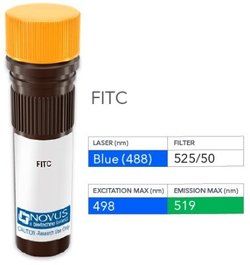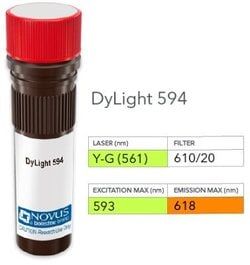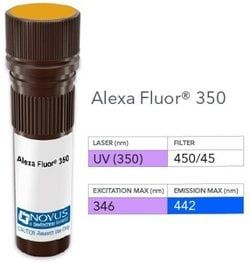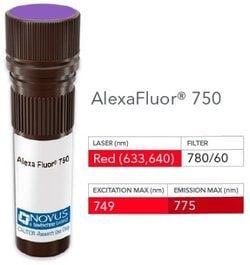TNF-alpha Antibody (MAb1), FITC, Novus Biologicals™
Manufacturer: Novus Biologicals
Select a Size
| Pack Size | SKU | Availability | Price |
|---|---|---|---|
| Each of 1 | NB006326-Each-of-1 | In Stock | ₹ 55,847.50 |
NB006326 - Each of 1
In Stock
Quantity
1
Base Price: ₹ 55,847.50
GST (18%): ₹ 10,052.55
Total Price: ₹ 65,900.05
Antigen
TNF-alpha
Classification
Monoclonal
Conjugate
FITC
Formulation
PBS with 0.05% Sodium Azide
Gene Symbols
TNF
Immunogen
Recombinant human TNF-alpha (Uniprot: P01375)
Quantity
0.1 mL
Research Discipline
Adaptive Immunity, Asthma, Autoimmune Diseases, Autophagy, Cancer, Cytokine Research, Diabetes Research, Immune System Diseases, Immunology, Innate Immunity
Test Specificity
This MAb recognizes human 17-26kDa protein, which is identified as cytokine TNF-alpha (Tumor Necrosis Factor-alpha). TNF-alpha can be expressed as a 17kDa free molecule, or as a 26kDa membrane protein. TNF-alpha is a protein secreted by lipopolysaccharide-stimulated macrophages, and causes tumor necrosis when injected into tumor bearing mice. TNF alpha is believed to mediate pathogenic shock and tissue injury associated with endotoxemia. TNF alpha exists as a multimer of two, three, or five non-covalently linked units, but shows a single 17kDa band following SDS PAGE under non-reducing conditions. TNF alpha is closely related to the 25kDa protein Tumor Necrosis Factor beta (lymphotoxin), sharing the same receptors and cellular actions. TNF alpha causes cytolysis of certain transformed cells, being synergistic with interferon gamma in its cytotoxicity. Although it has little effect on many cultured normal human cells, TNF alpha appears to be directly toxic to vascular endothelial cells. Other actions of TNF alpha include stimulating growth of human fibroblasts and other cell lines, activating polymorphonuclear neutrophils and osteoclasts, and induction of interleukin 1, prostaglandin E2 and collagenase production. TNF alpha is currently being evaluated in treatment of certain cancers and AIDS Related Complex.
Content And Storage
Store at 4°C in the dark.
Applications
Flow Cytometry, ELISA, Immunohistochemistry, Immunocytochemistry, Immunofluorescence, Immunohistochemistry (Paraffin), Immunohistochemistry (Frozen)
Clone
MAb1
Dilution
Flow Cytometry, ELISA, Immunohistochemistry, Immunocytochemistry/Immunofluorescence, Immunohistochemistry-Paraffin, Immunohistochemistry-Frozen
Gene Alias
APC1 protein, Cachectin, DIF, TNF, monocyte-derived, TNF-a, TNF-alphacachectin, TNFATNF, macrophage-derived, TNFSF2TNF superfamily, member 2, tumor necrosis factor, tumor necrosis factor (TNF superfamily, member 2), tumor necrosis factor alpha, Tumor necrosis factor ligand superfamily member 2, tumor necrosis factor-alpha
Host Species
Mouse
Purification Method
Protein L purified
Regulatory Status
RUO
Primary or Secondary
Primary
Target Species
Human
Isotype
IgM κ
Related Products
Description
- TNF-alpha Monoclonal specifically detects TNF-alpha in Human samples
- It is validated for Flow Cytometry, Immunohistochemistry, Immunocytochemistry/Immunofluorescence, Immunohistochemistry-Paraffin.




